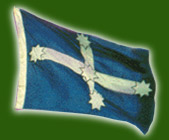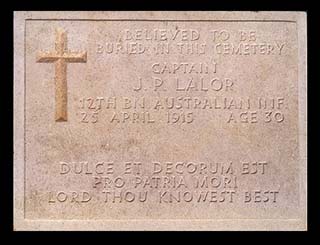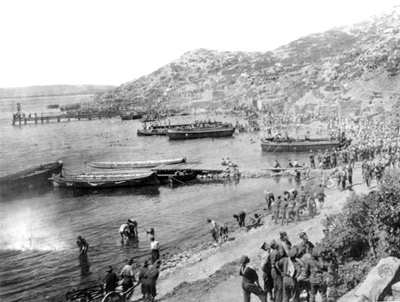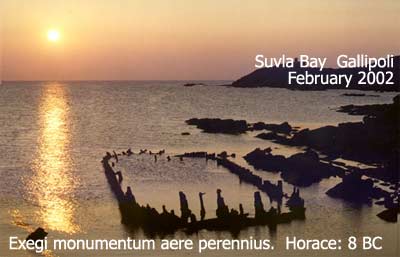|
|
|
||
| Gallipoli
was a part of The 'Great War'. It was so-called because it was
to be Then in 1917 Sir Fabian Ware founded the Commonwealth War Graves Commission. It's purpose was to mark and maintain the graves of the members of the forces of the Commonwealth who were killed, to build memorials to those who have no known grave and to keep records and registers, including, after the Second World War, a record of the Civilian War Dead. They have done so extremely well.
"We can truly say that the whole circuit of the earth is girdled with the graves of our dead . . . and, in the course of my pilgrimage, I have many times asked myself whether there can be more potent advocates of peace upon earth through the years to come, than this massed multitude of silent witnesses to the desolation of war." Contrast this perspective from 1922 with one of exuberance and challenge reprinted from 'The Town and Country Journal' May12th 1915. |
||
THE AUSTRALIANS' SPLENDID BEGINNING. Mr. Ellis Ashmead-Bartlett's graphic account of the glorious deeds of Australians in the Gallipoli Peninsula has sent a thrill of pride throughout the whole Commonwealth. It was a great achievement to land in the dark on a coast where the enemy's strength was unknown, and, having driven the Turks back, to hold the country firmly, while reinforcements followed. Every one of those who are taking part in the action against the Turks will appreciate the words of General Birdwood, who said he could not sufficiently praise their courage, endurance, and soldierly qualities. Though the list of casualties has brought grief to many homes, there is consolation in the thought that all our men at the front are fighting gloriously for the defense of the Empire. Many more thousands of young men are giving their services, and in course of time will join their comrades in the battle line. And in the coming years the memory of all those who fought in the greatest war the world has ever seen, and in the severest crisis through which the Empire has ever passed, will be handed down from generation to generation with pardonable pride. |
||
 |
 |
|
| At Gallipoli in a cemetery at 'Baby 700', there is a headstone commemorating a man whose name is known to all Australians. It is but one of the many where the remains were not found and so marked.The Commonwealth War Graves Commission did find 925,000 of the 1,700,000 men and women of the Commonwealth forces who died in the two World Wars and marked their graves accordingly. |
|
|
| The
inscription on Capt. J.P.Lalor's memorial plaque include the words:
The
British soldier/poet Wilfred Owen wrote a poem using this as the
title. |
||
| If in some smothering dreams you too could pace Behind the wagon that we flung him in, And watch the white eyes writhing in his face, His hanging face, like a devil's sick of sin; If you could hear, at every jolt, the blood Come gargling from the froth-corrupted lungs, Obscene as cancer, bitter as the cud Of vile, incurable sores on innocent tongues, - My friend, you would not tell with such high zest To children ardent for some desperate glory, The old Lie: Dulce et decorum est Pro patria mori." |
||
| Robert Rhodes James (Gallipoli 1965) describes J.P Lalor's assault on Baby 700: " The Australians were being virtually led by Lalor, a colourful personality even by Anzac standards; a deserter from the Royal Navy, he had served with the Foreign Legion and then got himself involved in a South American Revolution before returning to Australia to enlist in the army; clutching an old family sword firmly in his right hand, he was directing all operations from just above the Nek.....The summit of Baby 700 changed hands between the Turks and the Anzacs no less than five times." |
||
 |
||
| So
the main thought that comes to me as we approach another 25th of
April is that the wisdom expressed by a King in Flanders fields
will go unheard. John
Woods. |

